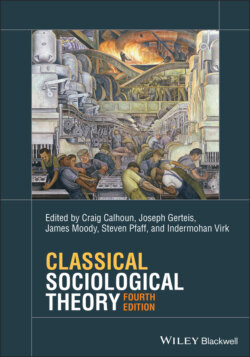Читать книгу Classical Sociological Theory - Группа авторов - Страница 35
Of the Causes, Generation, and Definition of a Common-wealth
ОглавлениеThe finall Cause, End, or Designe of men, (who naturally love Liberty, and Dominion over others,) in the introduction of that restraint upon themselves, (in which wee see them live in Common-wealths,) is the foresight of their own preservation, and of a more contented life thereby; that is to say, of getting themselves out from that miserable condition of Warre, which is necessarily consequent (as hath been shewn) to the naturall Passions of men, when there is no visible Power to keep them in awe, and tye them by feare of punishment to the performance of their Covenants, and observation of those Lawes of Nature set down in the fourteenth and fifteenth Chapters.
[…]
The only way to erect such a Common Power, as may be able to defend them from the invasion of Forraigners, and the injuries of one another, and thereby to secure them in such sort, as that by their owne industrie, and by the fruites of the Earth, they may nourish themselves and live contentedly; is, to conferre all their power and strength upon one Man, or upon one Assembly of men, that may reduce all their Wills, by plurality of voices, unto one Will: which is as much as to say, to appoint one man, or Assembly of men, to beare their Person; and every one to owne, and acknowledge himselfe to be Author of whatsoever he that so beareth their Person, shall Act, or cause to be Acted, in those things which concerne the Common Peace and Safetie; and therein to submit their Wills, every one to his Will, and their Judgements, to his Judgment. This is more than Consent, or Concord; it is a reall Unitie of them all, in one and the same Person, made by Covenant of every man with every man, in such manner, as if every man should say to every man, I Authorise and give up my Right of Governing my selfe, to this Man, or to this Assembly of men, on this condition, that thou give up thy Right to him, and Authorise all his Actions in like manner. This done, the Multitude so united in one Person, is called a Common-wealth, in latine Civitas. This is the Generation of that great Leviathan, or rather (to speake more reverently) of that Mortall God, to which wee owe under the Immortall God, our peace and defence. For by this Authoritie, given him by every particular man in the Common-Wealth, he hath the use of so much Power and Strength conferred on him, that by terror thereof, he is inabled to forme the wills of them all, to Peace at home, and mutuall ayd against their enemies abroad. And in him consisteth the Essence of the Common-wealth; which (to define it,) is One Person, of whose Acts a great Multitude, by mutuall Covenants one with another, have made themselves every one the Author, to the end he may use the strength and means of them all, as he shall think expedient, for their Peace and Common Defence.
And he that carryeth this Person, is called Soveraigne, and said to have Soveraigne Power; and every one besides, his Subject.
The attaining to this Soveraigne Power, is by two wayes. One, by Naturall force; as when a man maketh his children, to submit themselves, and their children to his government, as being able to destroy them if they refuse; or by Warre subdueth his enemies to his will, giving them their lives on that condition. The other, is when men agree amongst themselves, to submit to some Man, or Assembly of men, voluntarily, on confidence to be protected by him against all others. This later, may be called a Politicall Common-wealth or Commonwealth by Institution; and the former, a Commonwealth by Acquisition. […]
